- Home
- Lisa Wingate
The Sea Glass Sisters Page 6
The Sea Glass Sisters Read online
Page 6
Aunt Sandy turns up the battery-powered lantern, then taps my legs so that I swing around and let her sit.
“Sweetheart,” she says when she looks at my face, “what’s the matter?”
My eyes sting and brim with tears, and suddenly I’m like this old house. I can’t keep the storm out any longer. It forces its way through the cracks.
Mom gets up and comes to sit beside us on the sofa, and I pour out the whole story. Emily, the fact that I was the one who took the 911 call, how I botched it. How I feel like I must be coming apart at the seams lately. There is something so wrong with me. I don’t even know who I am anymore.
As the storm increases in intensity again, I fold over myself, lower my head into my hands, and Mom and Aunt Sandy close ranks on either side of me.
“Elizabeth, you can’t take this on yourself,” Mom insists. “In the first place, it isn’t your fault that woman took her little girl out in the middle of the night and left her alone in a car. In the second place, you don’t even know what has happened yet, or when it happened. That woman might just as easily be lying about how long she was away from the car and how soon she called 911 when she couldn’t find her little girl. You don’t know if there’s one thing you could’ve done to change how this ended.” It’s exactly what you’d expect a mother to say, what I would say if anyone were trying to lay this on Jessica or Micah. Defend first, ask questions later.
Aunt Sandy rubs my back. “Honey, I can’t tell you why this has happened. It’s a terrible thing. One of those happenings you can question and discuss until your mind goes numb. But I do know that you’re still here, and if you’re still here, no matter how much it hurts, there’s a reason for that. You may not feel it right now. And it’s okay to grieve. But it’s not okay to quit living. You’ve still got kids to raise and the family to take care of and work to do. I know it seems like your babies get to a point in life where they don’t need you anymore, but they do. There are just a few hard years here where everything’s changing, where the kids are testing their wings, and then it gets better. I promise.”
“It does,” my mother assures softly. “You just wait, Elizabeth. In a few years, that girl who’s driving you crazy right now will be a woman you are incredibly proud of. She’ll be your best friend, and when you look at her, you won’t be able to believe that you raised someone who has so much going for her.”
They lock themselves around me in a three-way hug, and we rock back and forth, joined together, a sisterhood against the storm.
CHAPTER 8
The sun is out and the water has begun to drain away by the time Aunt Sandy backs the Jeep down from the flatbed trailer that has kept it above the brackish soup of overwash, runoff, and debris. On the piers under the house, the flood has left a line almost three feet high, which we know is not a good sign for the shop. This house is on higher ground.
We’ve spent just under forty-eight hours waiting for the storm to pass and the floodwaters to drain. With the power out in Aunt Sandy’s neighborhood, we’ve been listening to weather-radio stories and getting word-of-mouth reports on the conditions farther north via the Hurricane Watch Net on Uncle George’s scanner and ham radio. There’s flooding and damage all the way up the Banks. Where the storm came ashore along the Jersey coast, the damage is catastrophic. Homes and businesses have been lost. And lives.
In Aunt Sandy’s house, other than the leakage we mopped and sopped around the windows, everything remains high and dry. The generator is running on the deck, providing enough power to keep the essentials going, but crews are expected to restore the electricity soon. Even the food in the refrigerator will survive, it seems. To preserve the gas in the cans outside, we maintained our campout lifestyle and left the refrigerator closed throughout the storm.
Now it’s time to move from survival mode to assessment and recovery. I know this process. It reads like a script in a 911 reference manual. Life preservation first, then damage control.
Aunt Sandy directs my mother to stay behind with the house and enlists me to go along on the reconnaissance mission to the shop.
Mom seems amenable enough. Working our way around storm wreckage and piles of sand transported by the raging water is more of an adventure than she really wants. She doesn’t seem to regret the fact that we stayed through the storm, even though North Carolina Highway 12, the one road in and out of Hatteras Island, has been lifted and buckled at Rodanthe and Mirlo Beach, and the bridge at Pea Island Inlet is out of commission. Emergency ferry runs will be starting soon to reconnect Hatteras with the mainland, but it’ll be a while before transportation on and off the island becomes routine again. For now, we are just here, like everyone else who rode out the storm.
“You watch her,” Mom mutters under her breath, leaning close to me as Aunt Sandy and the Jeep splash across six inches of water in the flooded yard. “She doesn’t need to be doing this. Whatever has happened in that shop has happened. There’s not a thing she can do about it now.”
“I will.”
“Don’t let her start hauling things out of the place and whatnot,” Mom insists. “She almost took a tumble in the hallway this morning. I know she was dizzy. I saw her feeling her way along the wall.”
I’ve seen things too, but I don’t share them with my mother. I do plan to try to talk to Aunt Sandy today. Maybe she will listen to me. I’ll probably sneak a call to Uncle George if I can, assuming the landline phone is working at the Seashell Shop. Cell service is out due to a damaged fiber cable up island. Aunt Sandy won’t be happy with me for butting in, but her husband needs to know what he’s coming home to.
“Don’t worry,” I say and kiss my mother on the cheek. There’s a new feeling between the three of us after the night of the storm.
On the way down the island, skirting logs, displaced patio furniture, and leaning telephone poles that have been cordoned off by emergency workers, Aunt Sandy talks about the most routine things as I stare at beach houses sitting in water, storm-damaged cars encased in sand wash, bits of relocated pavement, pieces of decks, and shreds of houses.
Aunt Sandy wants me to know that an empty nest isn’t the end of the world. It’s normal, what I’m going through. Even the distance between Robert and me. “It’s the leap from one phase of life into another,” she assures me. “Like when you went from being a young couple to being parents. Remember how hard that was? Remember those moments when you realized that you’d never again just hop in the car and go somewhere? That your life would always be tied to this new responsibility now? But it was the beginning of something too. It was the beginning of this great big adventure of raising a family. And that becomes your center point for a lot of years. It’s normal to feel lost when you suddenly realize that’s going away now. It’s normal to grieve something you’ve loved.”
I nod, still taking in the distractions. I consider what these people have been through, and I feel ridiculous. We shouldn’t even be talking about my problems right now.
The salt air blows into the Jeep and tries to steal my aunt’s baseball cap. She grabs the bill and pulls it lower, the sun reflecting off rhinestones that spell out the words Beach Time. “The trick,” she says, “is to find a new dream for the next part of your life. Then empty nest becomes a beginning, not an ending.”
“I know.” I try to shift her off the subject. “I just want to get through this year, through the graduations and everything, and then I’ll think about it.”
A stern look comes my way. “That’s not soon enough. Do you think those kids want a mother boohooing at every one of their little milestones this year? They want you to celebrate with them, Elizabeth. They’ve got enough of their own worries. They don’t need to be worrying about you. They need to know that you’ll be okay when they’re gone. That you and Robert are looking forward to new frontiers too.”
I try to think of it this way. I try to think of Robert and me doing things together again, just the two of us. Maybe going up to the north woods and spending
time in the cabin?
Then I wonder if he’s even interested. I can’t tell Aunt Sandy that, of course.
“Like when George and I came here.” She takes a breath, and I can tell she has a story she wants to share. She tells me about their first trip to the Outer Banks—a vacation Uncle George won through a sales contest at his job. She admits that they argued all the way from Michigan that first day. She wished they hadn’t even taken the trip. “But you know, the vacation gave us a new dream, a dream we could share together. We saw that old house by the highway in Hatteras Village, and I think we both knew. Putting a shop in there was our future. It seemed crazy, but it was what we needed. We never looked back, and we’ve never been sorry. This part of our life has been one of the best parts. The shop, the grandkids coming to visit, our house with the path to the shore. A whole new experience, instead of sitting around mourning what’s gone. I’m just . . .”
Movement on the side of the road catches my eye, and I shut out the rest of her sentence. There’s a woman running from a beach house, sloshing through the water in the front yard with something in her arms. I lean down and look in the side mirror after we pass. Something’s wrong. . . .
“Wait! Stop!” I reach across and clutch Aunt Sandy’s arm, strain against my seat belt to get a view over my shoulder. “Turn around! Somebody’s got a problem back there.”
Aunt Sandy cuts the wheel, circling a sand-covered pile of flotsam at the edge of the road. Our view is blocked momentarily, and then we see the woman. She’s in the ditch now, running. There’s a baby in her arms. Limp. My heart lurches upward, my mind rushes, and for a moment I wonder if this is a dream—if I’m really back at Aunt Sandy’s house, asleep.
But it’s real. It must be.
We squeal into the ditch, and the Jeep rams into a sandbank as it slides to a stop, tossing me against the seat belt hard enough that I’m addled for a moment before I spring the buckle, jump out, and run to the woman.
She’s carrying a toddler, a little girl. The baby’s wispy blonde hair is plastered to her head, muddy and wet. For an instant, my thoughts stall. I wonder again if I’m dreaming of Emily, but this child is younger.
“She fell!” the woman screams, her face flushed and covered with dirt and tears. “She fell off the deck into the water. I only turned my back for a minute. Oh, dear God, save my baby. She’s not breathing. She’s not breathing! Help my baby!”
There’s a split-second fear that I will freeze, but I don’t. A calm slips over me. A clarity of thought. A step-by-step logic that comes from training. “How long?”
I take the girl and lay her on the storm-washed sand alongside the road, shaking her to see if I can stimulate a response, but there is none.
A four-wheel-drive truck pulls over and two men run our way, but I’m barely aware of them. The script is in my head, but not only the script. There’s also the emergency training I’ve been through as part of the department.
Until you’re in the situation, you always wonder if you could do this in real life. Now it feels like second nature. “Find a landline and have someone call 911!” I say. Then I check her airway, give a quick breath into her mouth, feel for the rise and fall of her chest, try again to rouse her as the men in the truck race to the fire department, not far away.
I start chest compressions, count to thirty, give two breaths. She doesn’t respond.
Come on, come on, come on, I think.
Beside me, Aunt Sandy is on her knees, praying.
The baby’s mother keens and wails, calling out, “Sarah, Sarah, Sarah. Wake up, baby. Wake up for Mommy. Wake up!”
I repeat the process. Still no response after the second cycle. This child isn’t going to die right here beside the road. She’s not. This little girl will live a full life. She’ll build sand castles along the shore, celebrate birthdays, hunt for Easter eggs, and wear her favorite dress on the first day of school.
Please, God . . . please. This can’t happen. . . .
I begin a third cycle, then a fourth. There’s a siren in the distance. Help, I hope.
Finally . . . finally . . . there’s a thready pulse. A hint of life. And then a tiny cough. It is the most beautiful sound.
“Praise God!” Aunt Sandy lifts her hands heavenward.
I roll Sarah onto her side, support her head as she gags up a combination of water and stomach contents. When it’s finally over, she fights back as I try to scoop out her mouth, and then her wide blue eyes blink at us. She’s confused at first, disoriented. Her lip trembles and she starts to cry. I gently sit her up and let her mom cradle her so tightly that there’s not a whisper of space between them.
“Thank you,” the mother breathes, tears streaming down her cheeks. “Thank you. Thank you so much.”
I hear clapping, and all of a sudden I realize there are people around. A first responder runs in with a medical kit. At least a half-dozen bystanders are forming a circle around us. I don’t even know where they’ve come from.
I’m shaking as I stand up, and I just want to get to the Jeep and sit down. Catch my breath. I can’t believe this thing that has just happened. We watch until the first responders finish assessing the child and the crowd begins to disperse, then we leave with everyone else.
It all starts to seem unreal as we continue to the Seashell Shop. I sit looking at my hands, thinking, Did I do that? Did it happen?
“If you hadn’t been here, that little girl would probably be dead right now,” Aunt Sandy points out as we skirt a piece of toppled billboard near the Seashell Shop parking lot. The area around the store is a swamp, water still pooled over the parking spaces and probably a foot or two deep in the backyard, all the way up to the deck. The flood-line mark on the building pronounces the verdict without our even needing to go inside. When the eye of the hurricane passed by and the wind reversed direction, the overwash here was bad enough to cover the porch and reach partway up the long bay windows in the front.
Neither of us speaks as we wade through six inches of water, then climb the steps to the front porch of the old yellow house. Above the front door, the cheery ambers, blues, and yellows of a sign seem out of place now. The gold letters read:
Sandy’s Seashell Shop
An Ocean of Possibilities
“Well, I hope this thing worked.” She indicates Uncle George’s homemade floodgate on the door while fishing a hammer and screwdriver from the antique iron mailbox. “Looks like this storm may have made it in through the windows, though.” She glances toward the nearest one, which is clearly below the dirt line left by the water.
Even so, she seems upbeat. This is the thing I love about my aunt. She never gives up, even when the prognosis looks grim. Somehow I know that, no matter what we find inside, the water will not defeat her. And perhaps, after what we’ve experienced on our way to the shop, she realizes what I realize—that no matter what happens now, this day is already golden.
The fact remains, though, that the storm has been much worse than anyone anticipated. The hurricane hung over the island forever, dumping water. Yes, it’s only property damage, and property can be replaced, but I know that Aunt Sandy wouldn’t be selling the land in Michigan if she and Uncle George weren’t already tapped out from the last storm recovery.
I help her clear driftwood away from the front door. We pile it near the porch steps. The collection looks almost like art, if you don’t think about what it is and how it got there.
The scent of the air slipping from the building answers the looming question even before we loosen the last of the latches and move the shutter away from the door. It smells like our clothes washer when one of the kids throws in a load and forgets about it for a couple days. In a flash, I wonder if anyone is taking care of the laundry at home. How are they faring without me? Am I really as unneeded as I sometimes feel these days? Probably not. I know that’s the truth of it.
I think about what Aunt Sandy said to me in the Jeep, about making the leap to a new phase and it all being
part of the plan. Parenthood is the only career in which the better you do your job, the sooner you’re fired.
I’ll have to share that with Carol when I’m back at work. The thought makes me smile for about half a second, before I catch a glimpse through the glass door into Sandy’s Seashell Shop.
My aunt grabs a breath and lets it out through pursed lips. Her shoulders square before she turns the knob. “No point avoiding reality. It is what it is.” As she pushes it open, the door catches on a soggy floor mat we forgot to pick up. It’s the first thing she grabs when she’s able to squeeze partway inside. The drips create a waterfall as she hands off the mat and tells me to throw it over the porch railing. “Gotta start somewhere. That’s the only thing you can do with a mess. Start cleaning it up, a little at a time.”
Inside, the shop not only smells like mildew already, but it is a mess. The water reached over two feet high in here, swamping the old plank floors and the antique wooden beadboard around the lower parts of the walls. The moisture has seeped upward into the drywall above the wainscoting, drawing uneven mountainscapes in dirty shades of brown and gray.
“We just got all that fixed.” Tears sparkle in Aunt Sandy’s eyes, and she blinks rapidly, trying to deny them. “One season. One. That’s all we got out of the repairs we spent so much money on before a storm hit again. It doesn’t seem fair, does it?”
“No, it doesn’t.”
She pulls another breath, then puckers up and kisses the air on its way out. “Then again, this day is already a blessing.” As she echoes my earlier thought, a smile spreads from one side of her face to the other, dimpling her round cheeks and spilling the tears over. “You saved a life today.”
“We saved a life today.” Through all the gloom and the smell of newly forming mildew and the merchandise that has tumbled to the ground and been covered by the slime, an incredible light falls over me.

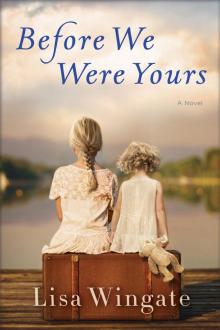 Before We Were Yours
Before We Were Yours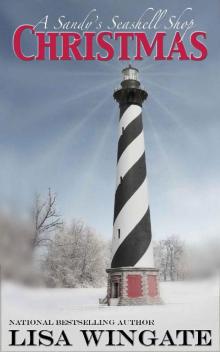 A Sandy’s Seashell Shop Christmas
A Sandy’s Seashell Shop Christmas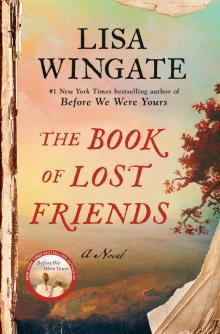 The Book of Lost Friends
The Book of Lost Friends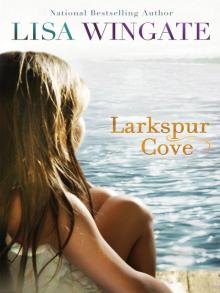 Larkspur Cove
Larkspur Cove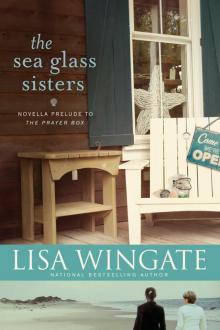 The Sea Glass Sisters
The Sea Glass Sisters The Language of Sycamores
The Language of Sycamores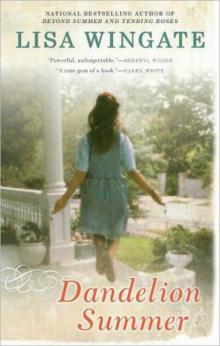 Dandelion Summer
Dandelion Summer Word Gets Around
Word Gets Around Beyond Summer
Beyond Summer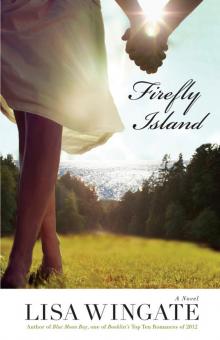 Firefly Island
Firefly Island The Tidewater Sisters: Postlude to The Prayer Box
The Tidewater Sisters: Postlude to The Prayer Box Talk of the Town
Talk of the Town![Blue Sky Hill [01] A Month of Summer Read online](http://i1.bookreadfree.com/i1/03/29/blue_sky_hill_01_a_month_of_summer_preview.jpg) Blue Sky Hill [01] A Month of Summer
Blue Sky Hill [01] A Month of Summer A Thousand Voices
A Thousand Voices Over the Moon at the Big Lizard Diner
Over the Moon at the Big Lizard Diner Never Say Never
Never Say Never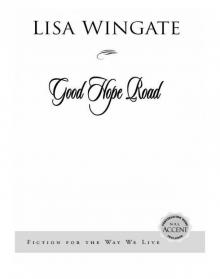 Good Hope Road
Good Hope Road The Summer Kitchen
The Summer Kitchen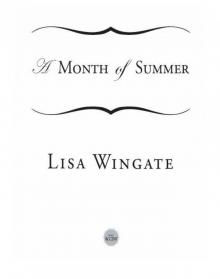 A Month of Summer
A Month of Summer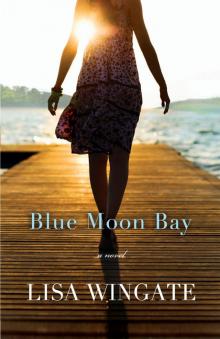 Blue Moon Bay
Blue Moon Bay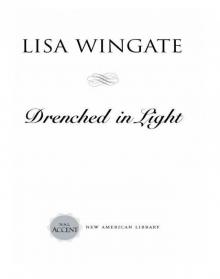 Drenched in Light
Drenched in Light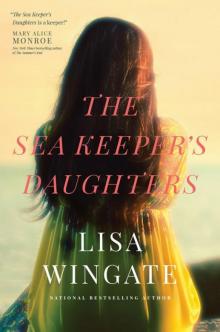 The Sea Keeper's Daughters
The Sea Keeper's Daughters